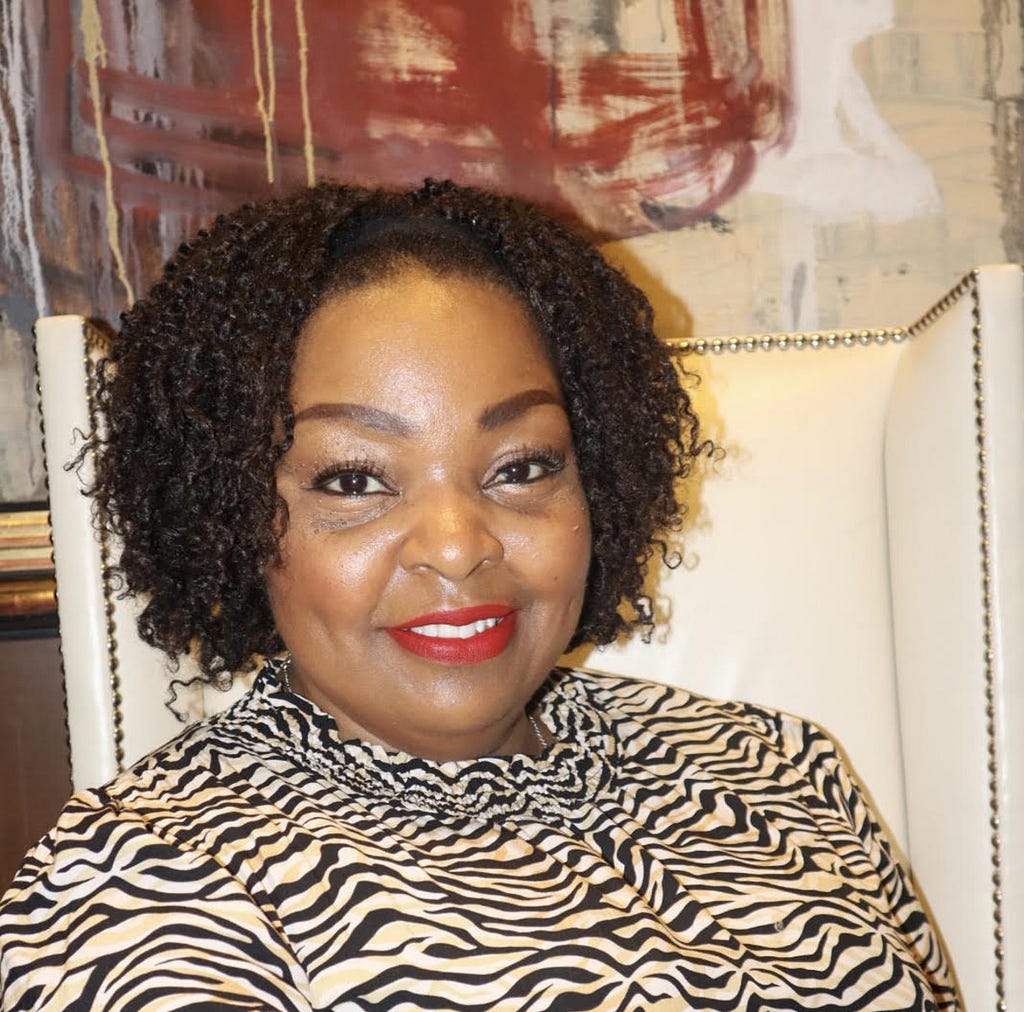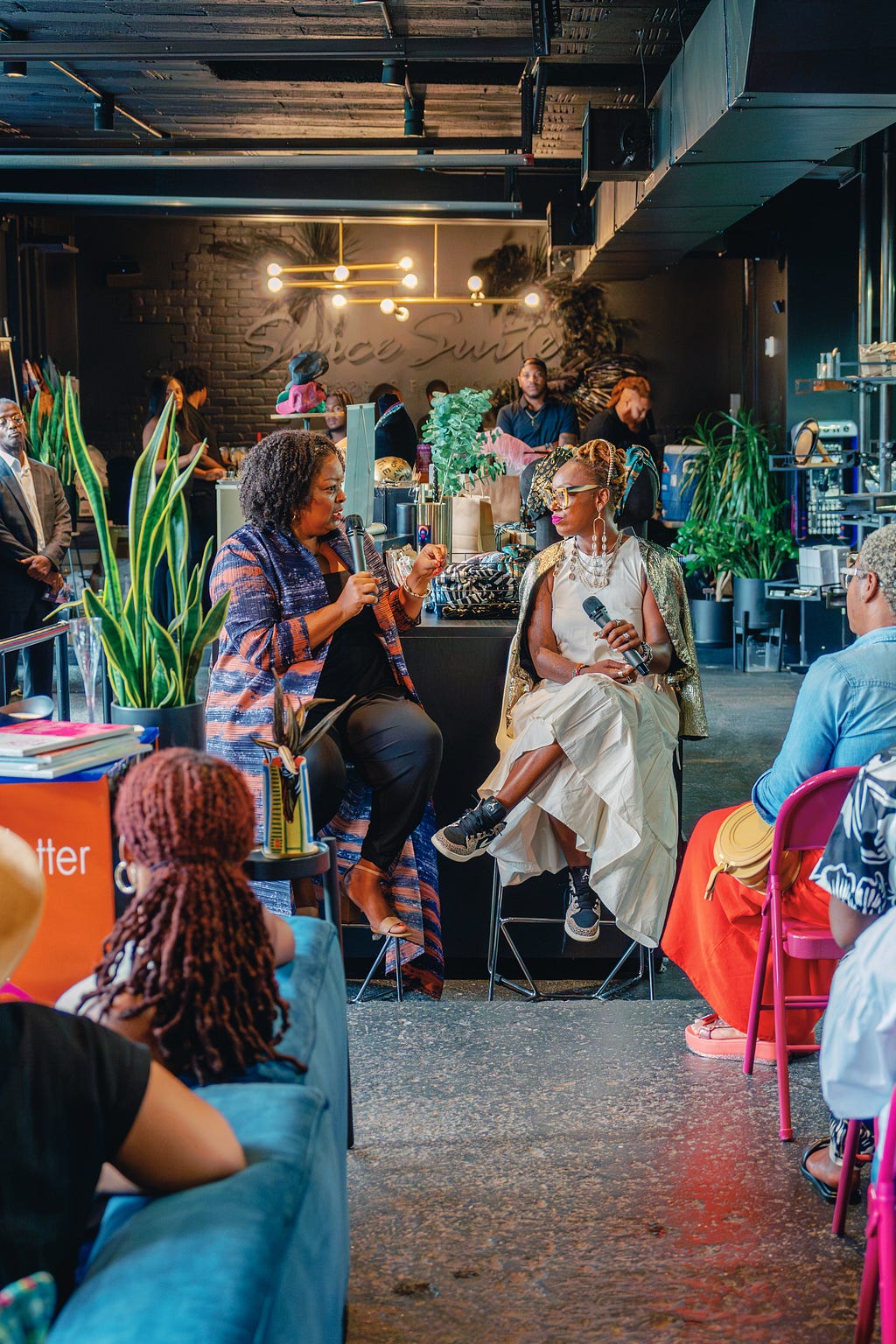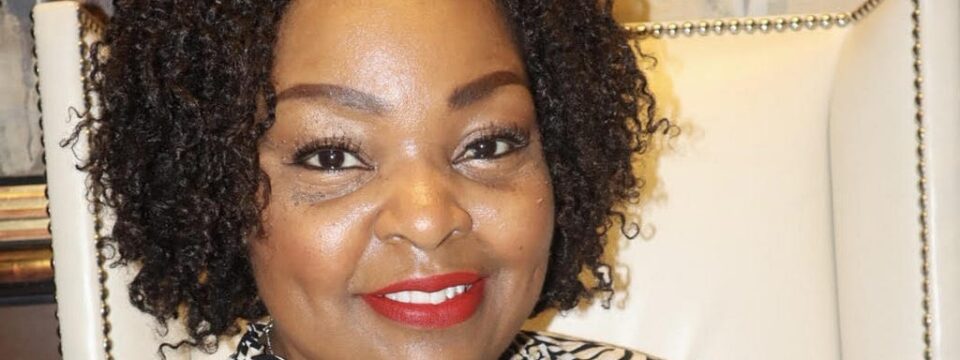Social Impact Heroes: Why & How Salah Goss of Mastercard Center for Inclusive Growth Is Helping To Change Our World

People like to say that you spend the first half of your career trying to get into important meetings and the second half trying to get out of them. But I would revise that and say you should spend the second half trying to get other people into those meetings. It’s about creating opportunities for the right team members to shine.
As part of my series about “individuals and organizations making an important social impact”, I had the pleasure of interviewing Salah Goss.
Salah Goss is a financial inclusion expert specializing in digital solutions. Currently Senior Vice President for Social Impact, Americas at the Mastercard Center for Inclusive Growth, her previous roles at Mastercard include leading international markets for financial inclusion and overseeing technology innovation and product development for developing markets. Salah has contributed to multiple patents, authored numerous articles, and been recognized for her work — including being named an Aspen Fellow in the Global Leadership Network and a 2024 Bellagio Center Resident, and awarded the Outstanding Corporate Social Intrapreneur of the Year by the World Economic Forum and Schwab Foundation for Social Entrepreneurship in 2019.
Thank you so much for joining us in this interview series! Can you tell us a story about what brought you to this specific career path?
My path to this work began when I was very young, only seven years old. My mother entered a sweepstakes she found on the back of an afro sheen bottle. It was from a Black-owned company that believed every African-American family should see Africa once. And my family won a trip to the Ivory Coast! During that trip, we visited an artisan village. I was a really artistic kid, and I connected deeply with the local artists. I actually still have a beautiful painting that I created with one of them.
As we were getting ready to leave, my mother pulled our suitcase out of the van and began giving away items to the families we had gotten to know — basic things like old jeans, ballpoint pens, toilet paper. What struck me, and ultimately put me on this career path, was that the families wanted to exchange their intricate, handmade art for items I thought were much less valuable. And I was upset that the exchange was so disparate — that they were willing to give away something they worked so hard on for basic items that I took for granted. I did not have the words for it, but the uneven access to resources hit me square in the face that day and I pledged to devote my life to tackling this inequality.
When I came back home to the U.S., I wrote an essay in which I set a goal to learn French and support communities in West Africa. And that’s exactly what I did: I learned French, worked in West Africa for five years, and dedicated my career to financial inclusion and opportunity.
That path has taken me through community organizing in Chicago, microfinance research in Senegal and Egypt, positions at the Soros Foundation and the Gates Foundation, and eventually to Mastercard. The common thread throughout has always been using finance as a tool for empowerment. Now, eleven years into my role at Mastercard, I’m still driven by that same mission I discovered in that artisan village: ensuring that economic opportunity isn’t determined by geography or circumstance.
Can you share the most interesting story that happened to you since you began leading your company or organization?
One of the most profound experiences in my career happened quite recently, when I was selected for the Bellagio Center Residency Program. I honestly didn’t think I would be chosen when I applied; past residents included luminaries like Maya Angelou and Ruth Bader Ginsburg. But I was accepted, and it was an incredible gift: a full month to step back and contemplate my 20+ year career in social impact. During this time, I dove deep into researching different frameworks of wellbeing and happiness, which led to some powerful insights about how we approach community development.
What emerged from this reflection was a fundamental truth that informs my work: we can’t segment people’s wellbeing into separate boxes — financial inclusion here, health there, climate resilience somewhere else. I’ve come to understand that wellbeing is interconnected and requires us to look at the whole picture, including the inequality between communities. This experience helped reshape how I think about social impact, moving away from siloed solutions toward a more holistic approach that recognizes the power of proximity and community in creating lasting change.
It has been said that our mistakes can be our greatest teachers. Can you share a story about the funniest mistake you made when you were first starting? Can you tell us what lesson you learned from that?
One of my earliest lessons in community organizing came from an embarrassing but ultimately rewarding mix-up. Fresh out of college and nervous about my first big community engagement, I spent hours practicing my speech in my car. When I finally arrived at the community center, the meeting was underway and I waited patiently for my chance to speak. When it was my turn, I delivered what I felt was a pretty impressive presentation — drawing on my academic training, mixed with all those years of watching my father preach as a pastor. I was feeling pretty proud of myself until the meeting organizers asked “And who are you?” Turns out I had walked into the wrong meeting!
Looking back, it taught me a valuable lesson that I still carry today: Always do your best no matter who is in the room. Even though I was in the “wrong” place that day, I actually ended up doing great work together with that community. We’ve all been in places or situations that didn’t turn out how we expected. But there’s often opportunity in that.
Can you describe how you or your organization is making a significant social impact?
The Mastercard Center for Inclusive Growth builds equitable and sustainable economic growth and financial inclusion around the world. We leverage Mastercard’s core assets, expertise, and technology, as well as the philanthropic might of the Mastercard Impact Fund, to advance this goal.
A crucial part of this work is Mastercard Strive, a portfolio of philanthropic programs in more than 20 countries around the world that aims to support 18 million small businesses to go digital, get capital, and grow networks and know-how. Mastercard Strive USA is our program to help American small business owners thrive in the digital economy. To date, we have reached 842,000 small businesses in the U.S. Working with 440 community lenders and business support organizations, we’ve helped deploy $44 billion in loan capital.
For example, we provided grant funding to Next Street to pilot, launch, and grow a funding platform (NYC Funds Finder) that connects small businesses with financial assistance and trusted resources. Developed in partnership with the NYC Department of Small Business Services, the platform has reached over 2,800 small businesses and partnered with 37 capital providers and technical assistance organizations.
Supporting small businesses is our best shot at transforming the economy and building inclusive growth. Small business ownership is a proven path to building household wealth and financial security, especially for entrepreneurs of color, if they get access to the right resources. These businesses are the driving force of the U.S. economy, employing 46% of the U.S. workforce and generating 44% of GDP. Unfortunately, even as the country experiences a record boom in entrepreneurship, too many small businesses face major barriers to accessing financing, networks, and coaching that could help them succeed. Mastercard Strive USA is bridging sectors and filling gaps to ensure that small businesses can get the support they need.
Can you tell us a story about a particular individual who was impacted or helped by your cause?
I think a lot about Briann Battle, an urban farmer in Los Angeles who turned personal tragedy into community transformation. After losing her son to SIDS in 2014, she started growing vegetables in her backyard as therapy. What began as a few pots of vegetables evolved into Here We Gro Gardens, a full-fledged urban farm producing organic fruits, vegetables, and herbs in an area where fresh food access is limited.
Briann has been able to grow her business to new heights thanks to Thinkwatts Foundation, which partnered with Mastercard to launch the inaugural cohort of its Business Builder Program in February 2022. The Business Builder Program incorporated Mastercard’s Digital Doors curriculum, which helps business owners like Briann learn how to accept digital payments, move their storefronts online, and protect themselves from cybercriminals. Through this program, Briann received updated mobile payment technology from Square, which helped her increase her sales by 78%. Digital analytics also give her valuable insights about her customers’ preferences — so she can see if a neighborhood prefers houseplants or flowers and stock her inventory accordingly.
But what makes Briann’s story particularly meaningful is how she’s using her success to address food insecurity in South Los Angeles, where liquor stores outnumber supermarkets and fresh food options are scarce. As a Black farmer — who make up only 1.4% of farmers nationwide — she’s not only growing her business but also proving, in her own words, that “Black farmers are here and thriving.” Her plans to expand to a 20-acre farm and create an educational nonprofit focused on food access show how empowering one entrepreneur can create ripples of positive change throughout an entire community.
Are there three things the community/society/politicians can do to help you address the root of the problem you are trying to solve?
When it comes to transforming the economy and building inclusive growth in the U.S., we need all sectors to work together. Everyone has skin in the game, and we all need to pool together our best expertise and resources.
We need the public sector, especially the federal government, to make sure that the billions of dollars it has allocated to support small business growth are delivered efficiently and equitably. We need the private sector to leverage their own significant capital, especially since the government is incentivizing them to do so. In particular, the private sector can move nimbly and create innovative technologies and platforms to help the small business support system rapidly scale to efficiently get money and other resources to every community.
And we need the philanthropic sector to help lenders and small business support organizations overcome persistent challenges. For example, many of these entities lack the resources to invest in technology or infrastructure to connect more entrepreneurs to their products and services. Philanthropy can provide catalytic and flexible funding to support these investments.
How do you define “Leadership”? Can you explain what you mean or give an example?
To me, leadership isn’t about being in front — it’s about creating the conditions for others to succeed. While it certainly involves setting a clear vision, true leadership requires both the confidence to guide and the vulnerability to listen. I believe a great leader knows when to pivot, but more importantly, knows when to get out of the way.
I’ve seen this play out repeatedly in our work at Mastercard Strive USA, where we’ve set an ambitious goal of unlocking $50 billion in capital and connecting millions of small businesses to the resources and networks that enable them to succeed. But what’s made these goals achievable isn’t top-down direction — it’s our ability to listen to and learn from our partners and grantees who often know more than we do. For instance, our partners helped us understand how Mastercard Strive USA needed to evolve differently from the Mastercard Strive Mexico program, particularly in working with federal funding and more mature businesses. These weren’t changes we originally envisioned, but by creating space for our team and partners to innovate, we’ve built something far more impactful than what we could have designed alone. That’s what leadership means to me: removing barriers, amplifying others’ voices, and letting those who are just as committed as you step up and lead in their own way.

What are your “5 things I wish someone told me when I first started” and why. Please share a story or example for each.
- Individual performance isn’t as important as group success. It took me time to realize that being a standout performer and stressing over my preparedness means little and is a waste of energy if my team isn’t cohesive and successful as a whole.
- People like to say that you spend the first half of your career trying to get into important meetings and the second half trying to get out of them. But I would revise that and say you should spend the second half trying to get other people into those meetings. It’s about creating opportunities for the right team members to shine.
- Proximity breeds genius. The communities closest to challenges are often closest to the solutions. Give them the microphone and they will tell you what they need.
- Don’t worry if your career path looks more like a river delta than a straight line. A path with many branches and channels is like a superpower. I’ve worked in many different sectors, from philanthropy to the private sector, and it helps me see issues and connections that others might miss.
- People mean everything. I learned this lesson deeply while running one of Mastercard’s tech labs in Nairobi, working with full-stack engineers, graphic designers, and other team members who had completely different working styles from mine. One team member told me that my question-heavy management style didn’t work for him; he needed time to step away and think before responding. We’re still in touch today, and that experience taught me that you can either be the person your colleagues complain about to their families or the one they brag about. Never let the “to-do list trees” make you lose sight of the “people forest.”
You are a person of enormous influence. If you could inspire a movement that would bring the most amount of good to the most amount of people, what would that be? You never know what your idea can trigger. 🙂
I want to inspire people to choose hope and to choose optimism. It’s easy to be overwhelmed by the challenges we face today — but leading with the positive is how you bring people together. The best way to ensure a positive outcome is by starting with a positive outlook.
Can you please give us your favorite “Life Lesson Quote”? Can you share how that was relevant to you in your life?
Maya Angelou said: “Do the best you can until you know better. Then, when you know better, do better.” This quote has special meaning for me because my mother, who has since passed, used to say it all the time. What I love about it is the inherent urgency in the word “when” rather than “if” — it assumes we will always be learning and growing.
That learning philosophy has guided me throughout my career. Each new challenge can be intimidating, but this quote reminds me that it’s okay to start where you are and keep evolving. We just have to keep learning, and we have to keep striving to do better.
Is there a person in the world, or in the US with whom you would like to have a private breakfast or lunch with, and why? He or she might just see this, especially if we tag them. 🙂
Ava DuVernay. When I was at my residency in Bellagio, I learned the power of talking to people from different disciplines. For example, a choreographer gave me incredible insight for my wellbeing research. I think, in addition to her amazing talent as a filmmaker, Ava DuVernay has a unique ability to root down in who she is, trust her unique vision and ability, and use her superpower to bring out the humanity in her stories. Sharing a meal and conversation with her would be a huge fangirl moment for me!
How can our readers further follow your work online?
https://www.linkedin.com/in/salahmgoss
https://www.mastercardcenter.org/
https://www.linkedin.com/showcase/the-mastercard-center-for-inclusive-growth/
https://www.instagram.com/cntr4growth/
This was very meaningful, thank you so much. We wish you only continued success in your great work!
Social Impact Heroes: Why & How Salah Goss of Mastercard Center for Inclusive Growth Is Helping To… was originally published in Authority Magazine on Medium, where people are continuing the conversation by highlighting and responding to this story.
